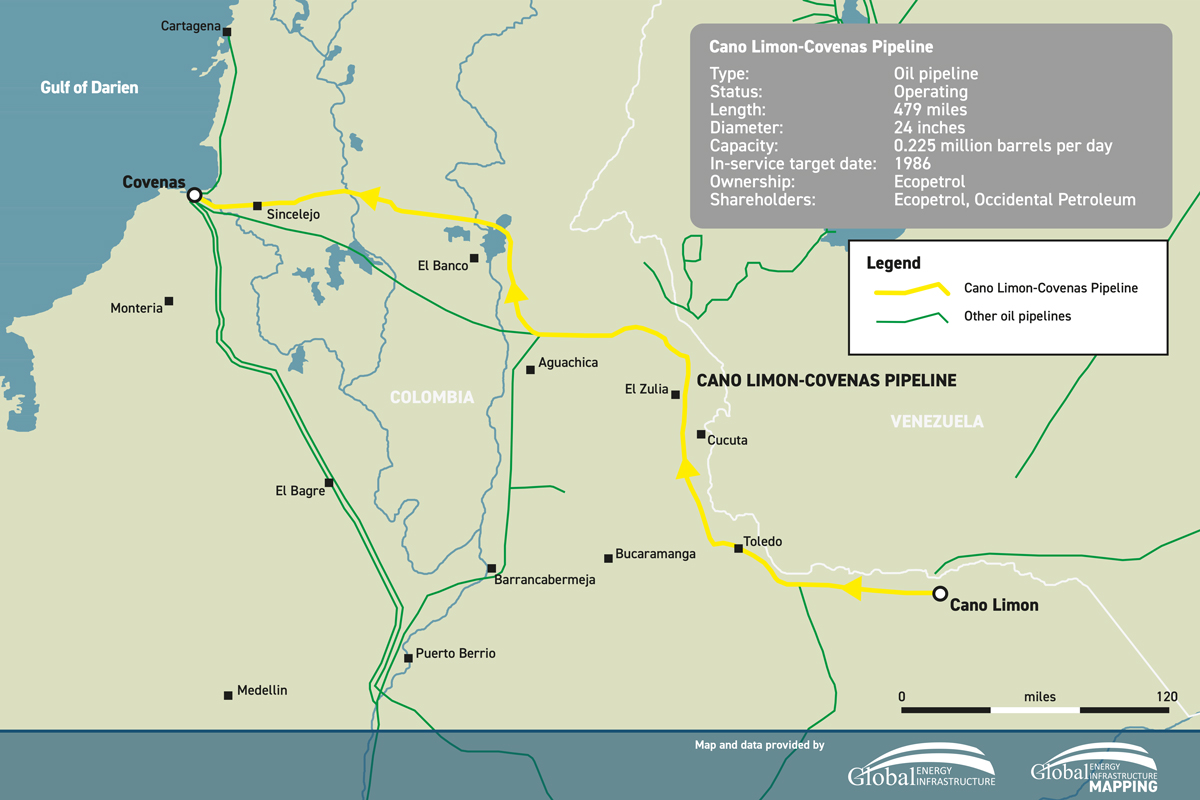June 2023, Vol. 250, No. 6
Projects
Nigeria’s 384-Mile AKK Gas Pipeline Now 70% Complete
Kinder Morgan Considers Expansion of SFPP Pipeline
Kinder Morgan launched a binding open season on a proposed expansion of a portion of its SFPP pipeline system from El Paso, Texas, to Tucson, Arizona.
The change would provide about 12,000 bpd of incremental capacity available for the transportation of gasoline, jet and diesel products.
The expansion capacity available, however, is scalable and still dependent on the o level of interest SFPP receives from potential customers. The open season process provides potential shippers the opportunity to obtain firm capacity through ship-or-pay volume commitments.
The open season began April 12 and was completed May 26. Kinder Morgan had not yet commented on the results at P&GJ’s publication deadline.
Nigeria’s 384-Mile AKK Gas Pipeline Now 70% Complete
Nigeria’s 384-mile (614-km) natural gas pipeline is 70% complete, according to state oil firm NNPC said, which pushes it beyond the initial first-quarter completion date.
The AKK pipeline will run from Ajaokuta in central Nigeria to Kano, passing through Kaduna, all in the north of the country.
Construction of the Ajaokuta-Kaduna-Kano (AKK) pipeline began in June 2020, with state officials announcing it would help generate 3.6 gigawatt of power and support gas-based industries along the route.
According to Reuters, the head of NNPC, Mele Kyari, said that the company was using its own revenue to fund the project in the central Kogi state. Chinese loans had financed the project when it began in 2020, but the deal fell through.
“We have so far spent over $1.1 billion on this project from our cashflow. This company can fund this project, so we do not need any support to deliver this project now," Kyari said.
Kyari gave no timeline for completion of the pipeline but said that the company has spent over $1.1 billion on the project thus far.
Petronas to Restart Malaysian Pipeline by Early ’24
Petronas is hoping to restart a major gas pipeline that ceased operations in October due to a leak, no later than the first quarter of 2024, a vice president of LNG trading for the company said.
The company, which declared a force majeure on its gas supple to Malaysia LNG Dua as a result of a pipeline leak caused by soil movement at its Sabah-Sarawak Gas Pipeline.
An internal investigation into the disruption is expected by mid-2023, the company said.
Petronas added it would like to extend its long-term contracts with utility customers in Japan, who have expressed concerning over supply shortages. Those customers include Tokyo Gas and Osaka Gas. Some of the distribution agreements will end this year.
Hungary Agrees to Receive More Russian Gas Shipments
Hungary said Russian energy giant Gazprom will preserve an option to supply it with more gas this year, in addition to supplies already agreed upon under long-term contracts.
Landlocked Hungary receives 80-85% of its gas from Russia. Last year, it was estimated about 80% of the countries crude oil imports also came from Russia. Hungary has been receiving 4.5 Bcm of gas per year from Russia, under a 15-year deal signed in 2021.
The gas transits mainly through the Turkstream pipeline, which allows Moscow to bypass Ukraine to carry Russian gas to southern Europe.
Neither Hungary nor Russia has disclosed the amount of extra gas to be supplied this year.
Sinopec to Build 259-Mile Hydrogen Pipeline in Mongolia
China’s Sinopec will build a pipeline to transfer hydrogen from renewable energy projects in China’s northwestern Inner Mongolia region to cities in its east, the nation’s state media outlet said.
The 260-mile (400-km) pipeline will run from Ulanqab, in the remote Inner Mongolia region, to the capital of Beijing and carry an initial capacity of 100,000 tpa, said the report, the report said, citing Sinopec Chairman Ma Yongsheng.
Ports will be built along the pipeline to allow access to new potential hydrogen sources, the report added. China currently operates pipelines for “gray hydrogen,” which is produced from fossil fuels.
State-owned Sinopec, which is China’s largest hydrogen producer, said earlier this year, it plans to build a green hydrogen plant in the Inner Mongolian city of Ordos, which will have an annual capacity of 30,000 tons. The company launched a green hydrogen project in the western Xinjiang region in 2021.
Arctic Barents Sea Pipeline Getting Another Look from Gassco
Building a pipeline to transport gas produced in the Arctic Barents Sea could be worth re-examining due to an increased focus on supply security and Norway exporting more of its gas to Europe.
According to Reuters, gas operator Gassco has said Norway’s oil and energy ministry asked the company to consider methods of increasing transport options from the southern region of the sea.
“The increased focus on security of supply and deliveries of Norwegian gas to Europe in light of the energy situation is strengthening the necessity of Norwegian gas as part of the energy mix going forward,” Gassco is quoted as saying.
Gassco evaluated three options: expanding LNG capacity, converting gas to carbon-free ammonia, which would then be shipped to customers, as well as building a processing plant including carbon capture and a pipeline that connects to the existing infrastructure.
In 2021, a Gassco study found there was not enough of an upside for Norway to increase exports. Currently, gas produced in the region can only be exported via Equinor’s Hammerfest LNG plant.
Based on resource assumptions for the Snoehvit field, which feeds Hammerfest LNG, the plant would be fully in use no sooner than 2040.
Peninsula Pipeline Finishes Natural Gas Expansion in Florida
Chesapeake Utilities subsidiary, Peninsula Pipeline Company (PPC), has completed an 11.3-mile expansion that will bring additional natural gas capacity to the Vero Beach, Florida, area.
The $10.5 million project interconnects with existing PPC infrastructure in the city of Sebastian and extends to Vero Beach. The new facilities will transport natural gas to five new delivery points, extending service to the communities of Wabasso, Wabasso Beach, Indian River Shores, North Hutchinson Island and Harbor Isles.
Construction began during the second quarter of 2022 and was completed on schedule and within budget, the company said. PPC partnered with another third-party utility, Florida City Gas (FCG), on the project.
The company expects this project to generate additional annual adjusted gross margin of $1.8 million in 2023 and $2.5 million in the following years.
“We operate in service territories where populations and customer demand for energy continue to grow,” Jeff Householder, president and CEO of Chesapeake Utilities Corp., said. “We remain committed to meeting this demand and providing safe, affordable and reliable natural gas service including making additional infrastructure investments in these growing areas.”
Peninsula Pipeline owns and operates several intrastate natural gas pipelines throughout seven counties in Florida. PPC provides transportation service, linking interstate pipelines to local distribution systems, industrial customers and power generation facilities. PPC completed recent expansions in Northwest Florida and West Palm Beach, Florida.
Colombia’s Cano Limon-Covenas Pipeline Attacked Again
The suspended pumping operations at Colombia’s Cano Limon-Covenas oil pipeline will go on a little longer following another bombing, which its infrastructure in the Arauca province, oil transportation company Cenit said.
The attack was the ninth of 2023, and it occurred within the city limits of Saravena municipality. The company went into its emergency cleanup plan to control the related oil spill and pollution, said a spokesman for Cenit, a subsidiary of majority state-owned oil company Ecopetrol.
“The company calls on the nearby community to refrain from approaching the site of the incident, until the evaluation, repair and clean-up operation that is in place is completed,” Cenit said in a statement to the media.
Pumping along the pipeline has been suspended since mid-April following another attack. Cenit said the return to operations schedule will be dependent on the military’s ability to secure the area so repairs can continue.
The Cano Limon-Covenas pipeline, with a capacity of 210,000 bpd, runs along Colombia's northern border with Venezuela.
Shell Restarts Pierce Field Operations in UK North Sea
An upgrade allowing gas production at the Pierce field has prompted Shell Plc to restart operations at that location. For years, only oil was produced there. The Pierce operation, in the Central North Sea, is a joint venture between majority-owner Shell and Ithaca Energy.
Shell said a new subsea gas export line was also installed, connecting to the SEGAL pipeline system, bringing gas ashore at St. Fergus, north of Aberdeen.
The gas will be sent through newly installed subsea pipelines, and the oil will be transported by tanker, it added.
Peak production at the field is expected to reach 30,000 boe/d, Shell said in a release to the media. That would be more than twice the production prior to redevelopment, with more gas being produced than oil.
The “substantial modifications” were made to the floating production, storage and offloading vessel (FPSO) vessel Haewene Brim, owned and operated by Bluewater. It had stopped production in 2021.







Comments